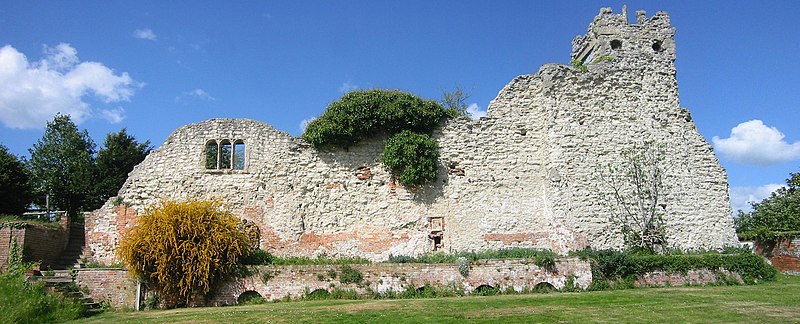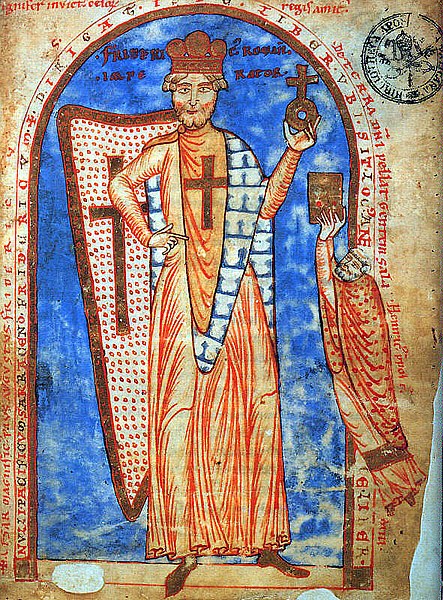 |
| Henry and Eleanor |
Henry’s
return to England was in part delayed by the hostility of Louis VII, newly
returned from the Second Crusade. He was not pleased to realise that
Normandy and England could soon be ruled by the same person and refused to
recognise Henry as Duke of Normandy. Eventually Geoffrey advised bribing Louis
by giving up the Vexin in return for recognition as duke[i]; it worked. At the end of
August 1151 Henry paid homage to the king of France for Normandy.
Less than a
month later Geoffrey died at the age of thirty-nine. Henry FitzEmpress had to
travel to Anjou to take homage from his vassals. He was then embroiled in an
affair of the heart[ii],
kept secret as his future wife was the wife of his liege lord; Eleanor of Aquitaine, Queen of France. In a fraught
divorce it was finally agreed that Louis would keep custody of the two French
princesses, their daughters and on 18th May 1152 Henry married the
heir of William X, Duke of Aquitaine[iii].
Louis then
took sides with Stephen and Eustace in a futile attempt to drive out Henry from
his lands in Normandy. Henry FitzEmpress saw off the attacks but time was
marching on and his supporters in England were crying out for his return. By
the time Henry FitzEmpress returned to England the war had turned in Stephen’s
favour; he was besieging Wallingford Castle having taken Newbury in 1152.
 |
| Malmesbury Abbey |
Henry
FitzEmpress arrived on 6th January 1153 bringing 140 knights and
3,000 foot soldiers carried in 36 ships. He was hastily followed over the
Channel by Eustace. Henry made his way to Malmesbury where the castle was surrendered to him after a stand-off.
Henry then
rode to Stockbridge to meet with the Archbishop of
Canterbury and the Bishops of Winchester, Bath, Salisbury and Chichester. The purport of the meeting was to
discuss the return of Devizes Castle to the control of the Bishop of Salisbury.
This done the bishops agreed to use their best efforts to reach a consensus
between the warring parties.
Coming to Terms
 |
| Wallingford Castle |
Stephen was
now over sixty and had lost his appetite for war. He had relied a lot on
Matilda of Boulogne and her death the previous summer had knocked away one of
his main supports. Of his supporters the Earl of Leicester had transferred his support to Henry
FitzEmpress who was taking control of the midlands. William d'Aubigny, Earl of Arundel argued the futility of further fighting.
By July
Henry arrived at Wallingford where Stephen was once again besieging Brian
Fitzcount’s castle. Henry’s forces in turn besieged Stephen’s wooden
siege-castle at Crowmarsh Gifford. Stephen and Henry were ambushed by
their own supporters who persuaded the two men to meet and agree a temporary
truce.
Stephen's
son Eustace opposed any rapprochement with the enemy, he clearly felt betrayed
by his father’s actions;
Eustace for his part,
greatly vexed and angry because the war, in his opinion, had reached no proper
conclusion, left his father and went out of sight of the court, and met his
death from grief within a few days.’[iv]
but he died
suddenly in the August, allegedly struck down by the wrath of God while
plundering church lands near Bury St Edmunds. Eustace’s death left the way open for the two parties to
agree peace terms.
Henry
FitzEmpress and Stephen were persuaded to meet on 6th November 1153
at Winchester. Stephen announced the Treaty of Wallingford at Westminster
Cathedral at Christmas: he recognised Henry FitzEmpress as his adopted son and
successor in return for Henry paying homage to him.
‘The king first acknowledged….the hereditary right
which the duke had in the kingdom of England. And the duke generously conceded
that the king should hold the kingdom for the rest of his life, if he wished.’[v]
Other
conditions included:
- Stephen promising to listen to Henry's advice,
but he retained all his royal powers; Henry conceded that;
- Stephen's remaining son, William,
would do homage to Henry and renounce his claim to the throne, in exchange
for promises of the security of his lands;
- Key royal castles would be held on Henry's behalf
by guarantors, whilst Stephen would have access to Henry's castles;
- The numerous foreign mercenaries would be demobilised and sent home.
 |
| Cathedral cloister |
Henry less than a year to wait; the young FitzEmpress became Henry II on 25th October 1154 when;
‘[Stephen] was suddenly seized with a violent pain
in his gut, accompanied by a flow of blood.’[vi]
Matilda did
not attend the coronation but it was one of the two crowns of gold that Matilda
brought back from Germany with her that Henry wore that day.
A Mother’s Influence
Matilda had
set up household in Rouen in a residence built by her father at his park at Quevilly, on the banks of the River Seine. The house was near to the priory of Notre Dame du Pré[vii].
 |
| Matilda |
It was from here that Matilda acted
as her son’s surrogate when Henry was on his travels across his vast domains.
Henry trusted his mother’s judgement; one royal mandate, issued in England to
the justices in Normandy in the late 1150s said;
‘If you do not do this let
my lady and mother the empress see that it is done.’[viii]
Matilda
appears to have persuaded Henry not to invade Ireland which he wanted to bestow
upon his younger brother William. William was given lands in England in lieu.
In 1156
Matilda was forced to preside over a bitter family conference in Rouen, after
the twenty two year old Geoffrey rose up in rebellion against his elder
brother. Henry was immovable and Geoffrey stormed off to wage war. Henry took
less than six months to take Chinon, Mirebeau and Loudun. Geoffrey ceded his claim to Anjou
and settled for an annuity He died two years later, an embittered and
humiliated young man. William died in Rouen six years later, his mother by his
side.
 |
| Frederick Barbarossa |
In 1157
Matilda was probably involved in the negotiations with Emperor Frederick Barbarossa over the fate of the mummified hand
of St James which Matilda had brought to England after the death of her first
husband. The emperor wanted the relic returned to the imperial treasury while
Henry was determined to keep it at Reading Abbey. Frederick was eventually
persuaded to drop the matter following the receipt of numerous gifts including
four great falcons and a magnificent campaigning tent that struck awe into its
beholders.
Old Age
In 1160
Matilda suffered a serious illness and her influence over Henry waned when she
advised against the appointment of Chancellor Thomas Becket as Archbishop of Canterbury[ix]. Matilda was involved in
attempts to mediate between Henry and his Chancellor Thomas Becket when the two
men fell out in the 1160s.
 |
| Henry II and Beckett |
When the
Prior of Mont St Jacques asked Matilda for a private interview on Becket's
behalf to seek her views, she provided a moderate perspective on the problem
Matilda explained that she disagreed with Henry's attempts to codify English
customs, which Becket was opposed to. She also condemned poor administration in the English Church
and Becket's own headstrong behaviour.
Throughout
her retirement Matilda still
continued her role as peacemaker; as late as 1167 she was trying to de-escalate
the problems between her son and Louis VII, this time a quarrel over crusading
funds. A truce was agreed in August and Henry then launched on an invasion of
the Duchy of Brittany.
Weeks later
Henry was recalled by the death of his mother. Matilda died on 10th
September 1167 surrounded by monks from the monastery of Bec. She was buried in the
Abbey, in a service led by Rotrou, the Archbishop of Rouen. Whether she would have approved of
the inscription on her tomb is moot;
‘Great by birth, greater by
marriage, greatest in her offspring, here lies the daughter, wife and mother of
Henry.’[x]
Matilda left
the abbey the contents of her private chapel, having already donated much of
the treasure she had brought back from Germany.
Bibliography
The Feudal
Kingdom of England 1042-1216 – Frank Barlow, Pearson Education Ltd 1999
Gerald of
Wales – Robert Bartlett, Tempus Publishing Ltd 2006
Stephen and
Matilda – Jim Bradbury, The History Press 2005
She Wolves –
Helen Castor, Faber and Faber 2010
Early Medieval
England – MT Clanchy, Folio Society 1997
The
Plantagenets – Dan Jones, William Collins 2013
King Stephen
– Edmund King, Yale University Press 2010
Doomsday to
Magna Carta – AL Poole, Oxford University Press 1987
Early
Medieval England – Christopher Tyerman, Stackpole Books 1996
Henry II –
WL Warren, Yale University Press 2000
www.wikipedia.en
[i]
In 1158 a treaty between Henry and Louis agreed that Henry’s son Henry and
Louis’ daughter Margaret would marry and the Vexin would be her dowry
[ii]
It is equally likely that Henry had his eye on Eleanor’s vast inheritance. It
was alleged by Gerald
of Wales (a chronicler hostile to the Angevins) that Eleanor had an affair
with Geoffrey of Anjou
[iii]
Henry failed to gain Louis’ consent to the marriage, as by right he should have
done as one of Louis’ vassals
[iv]
King Stephen - King
[v]
Henry II - Warren
[vi]
She-Wolves - Castor
[viii]
She-Wolves - Castor
[ix]
Henry must later have rued the day that he did not follow his mother’s advice
[x]
She-Wolves - Castor
She did more for England as the monarch's mother than as queen though it was a shame she couldn't persuade Henry to pass over Becket. A contentious choice, and rather a turbulent priest.
ReplyDelete